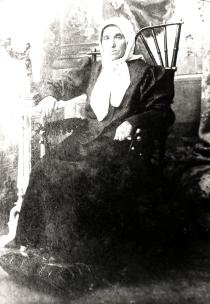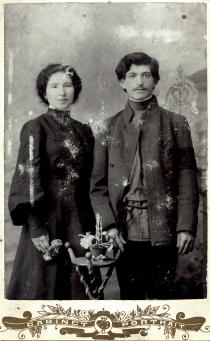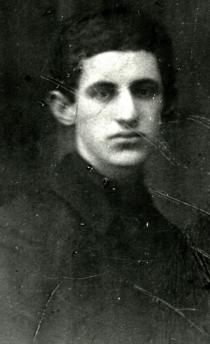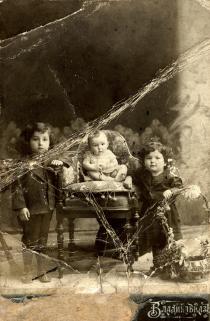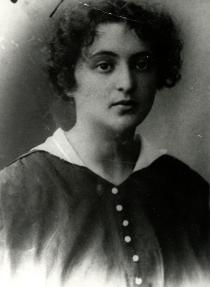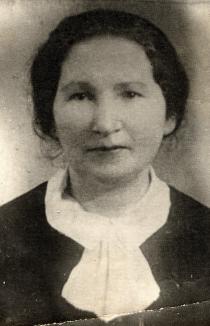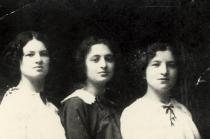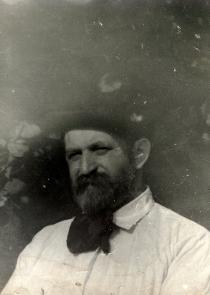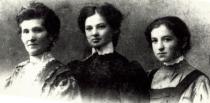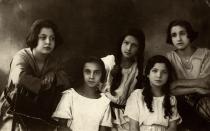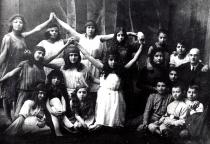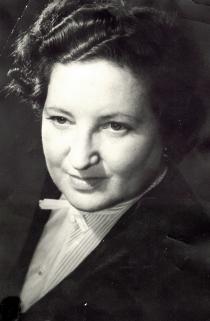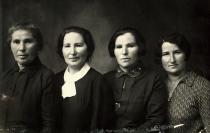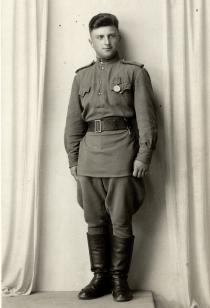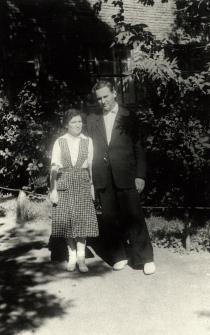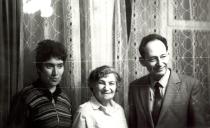My mother, Sonya Ratmanskaya (second on the left) and her sisters: Sosha Faibisovich, Riva Neveleva, and her brother Yakov's wife, Sofia Smekhova. The photo was taken in Bryansk in 1935.
My mother, Sofia Ratmanskaya [nee Smekhova] came from the town of Pogar, Belarus. She was born in 1886. Her father was a tin-maker. He also had seven children: Monya, Khaya, Etya, Sosha, my mother Sofia, Riva, and Yakov. There were two brothers (the elder one died of tuberculosis) and the rest were women. By the way, uncle Yakov was also a tin-maker. His son Ilya was a pilot during World War II, later he was a colonel and lived in Leningrad.
My father studied embroidery. My father was very talented. He embroidered dresses, fabric. My mother and father got married through embroidery. Traveling to different cities in search of a job, my father found himself in a workshop where my mother was sewing coats, and my father began to work there as an embroiderer.
father was very talented. He embroidered dresses, fabric.
My mother and father got married in Pogar. It was a small town. My father was involved in some revolutionary group, so he was given a false passport under the name of Pasternak and he was illegally sent to Tsaritsyn. My mother went with him. My elder brother Abram was born in Tsaritsyn in 1908. I don't know any details of my father's revolutionary activities. He never talked about it. But my brother was Jewish, so he was circumcised in secret: father found a rabbi in Tsaritsyn and received a special certificate for Abram. Abram is Jewish, but his skin is very dark. Later, the group that helped my father sent him to Vladikavkaz. It was some time around 1909.
There was a good Jewish community in Vladikavkaz, but my father had a passport under the name Alexander Sokolov. [He was given this typical Russian name to hide his Jewish origin.] My sister Vera and I were born in Vladikavkaz. We weren't registered anywhere because my father was only able to register us later - that's why my passport says that I was born in 1911, whereas I was actually born in 1909. Vera was born in 1912.
At the end of 1917 we came to Kiev, to my father's parents. Later, because my father was an embroiderer and his work was in demand, my parents found a flat. It was a 5-storey building made of bricks. We lived on the first floor, but it was high. We had a separate flat. There was one small room, which my brother and I often entered through the window. It was hard to climb through that window, but my brother could do it. Then we had a big room and the third room opened from here, but it was right next to the toilet, so it was practically impossible to live in it. We lived there for a short time but then it became impossible - we hardly ever entered it. To get to the kitchen we had to go downstairs, to the end of the long corridor. The kitchen was small, but it was ours, separate from the neighbors.
After my sister Nadya was born, we four children, our parents and one of my father's relatives lived in this flat. My father's youngest sister Makhlya and her husband lived with us for a long time. Then Manya also lived with us for a while. Sometimes we rented that room out.
Our life was very hard because when the Reds, the Whites or the Poles came it was hard for my parents to decide whom they should embroider for and whom not. When the NEP began life became better. We even had enough to eat: we had white bread, butter, and when mother went to the market, I usually went with her. But in general we were always thin and weak and never had proper clothes. Vera was sick almost all the time. We had one coat that our mother sewed for us from an overcoat, and we wore it in turns when we had to go to school.

